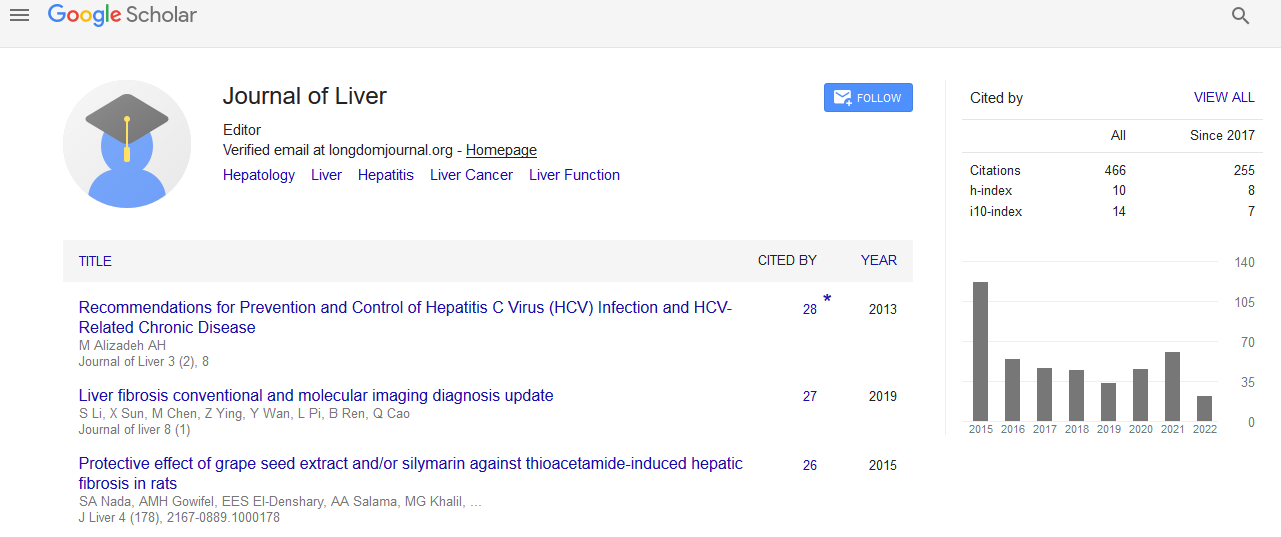PMC/PubMed Indexed Articles
Indexed In
- Open J Gate
- Genamics JournalSeek
- Academic Keys
- RefSeek
- Hamdard University
- EBSCO A-Z
- OCLC- WorldCat
- Publons
- Geneva Foundation for Medical Education and Research
- Google Scholar
Useful Links
Share This Page
Journal Flyer

Open Access Journals
- Agri and Aquaculture
- Biochemistry
- Bioinformatics & Systems Biology
- Business & Management
- Chemistry
- Clinical Sciences
- Engineering
- Food & Nutrition
- General Science
- Genetics & Molecular Biology
- Immunology & Microbiology
- Medical Sciences
- Neuroscience & Psychology
- Nursing & Health Care
- Pharmaceutical Sciences
Does Hepatitis B antigen HBx promote the appearance of liver cancer stem cells?
World Congress on Hepatitis
July 20-22, 2015 Orlando, Florida, USA
Mark A Feitelson
Keynote: J Liver
Abstract:
Hepatitis B virus (HBV) is a major etiologic agent of chronic liver disease (CLD) and hepatocellular carcinoma (HCC). HBV encoded X antigen, HBx, and pathways implicated in the self-renewal of stem cells contribute to HCC, but it is not clear whether HBx expression promotes ?stemness?. Thus, experiments were designed to test the hypothesis that HBx triggers malignant transformation by promoting properties that are characteristic of cancer stem cells (CSCs). To test this hypothesis, HepG2 cells were stably transduced with HBx and then assayed for phenotypic and molecular characteristics of ?stemness?. The relationship between HBx and ?stemness?-associated markers was also evaluated by immunohistochemical staining of liver and tumor tissue sections from HBV infected patients. The results showed that Oct-4, Nanog, Klf4, ?-catenin and EpCAM were activated by HBx in vitro and in vivo. EpCAM was detected in the nuclei of human HCC cells from infected patients. HBx promotes ?stemness? by activating ?-catenin and epigenetic up-regulation of miR-181, both of which target EpCAM. HBx expression was also associated with depressed levels of E-cadherin. Moreover, HBx stimulated cell migration, growth in soft agar, and spheroid formation. This work is the first to propose that HBV promotes ?stemness? in the pathogenesis of HCC. HBx associated up-regulated expression of multiple ?stemness? markers support the hypothesis that HBx contributes to hepatocarcinogenesis, at least in part, by promoting changes in gene expression that are characteristics of CSCs.
Biography :
Mark Feitelson attended Cypress College (Cypress, CA) from 1970-72, and then received a BS degree in Biology from the University of California, Irvine in 1974. Advanced studies resulted in a PhD in Microbiology and Immunology from the UCLA School of Medicine in 1979. His thesis presented the genetic organization of the rabbit papilloma virus. He was then an American Cancer Society Postdoctoral fellow in the Department of Medicine at Stanford University from 1980-1982, where he started his work with hepatitis B virus (HBV). He was then recruited to the Fox Chase Cancer Center by Dr. Baruch Blumberg (who won the Nobel Prize for his discovery of HBV) where he continued his work in HBV. He is presently Professor of Biology at Temple University and Associate Director of the Temple Biotechnology Center. He has been consistently funded by NIH and foundations since 1988 for basic science work on HBV and has attracted 10 contracts from industry for translational and applied work since 1997. He has over 100 publications in highly ranked international scientific journals, has written two books; delivered more than 160 oral presentations and/or posters at national and international scientific meetings, and has delivered more than 100 invited lectureships all over the world.

